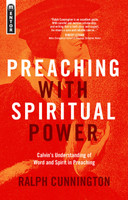“Homiletics.” What is it? One educator defined “homiletics” as, ”the art and science of saying the same thing that the text of Scripture says. The study of sermon preparation is technically called homiletics.” At its most basic level, homiletics is the study of the preparation and delivery of a sermon. Truly, books on the subject of homiletics abound. While they are undoubtedly helpful to the preacher in his preparation, there is still a vital need for something (or, perhaps, Someone) else to be addressed! What of the Holy Spirit in relation to homiletics?
One may spend hours diligently studying the Scriptures, desiring to clearly communicate God’s Word to the gathered church, but without the agency of the Holy Spirit illuminating the text, empowering the preacher, and giving spiritual life to the congregation, the words spoken by the preacher may be no more than a loud gong or a clanging cymbal in the ears of God’s people. Albert N. Martin, in his book Preaching in the Holy Spirit (Reformation Heritage Books, 2011), has done preachers a great service in zeroing in on “the agency and operations of the Holy Spirit in and on the preacher himself in the very act of preaching” (p. 3). Brief and pointed, Martin explores, in 67 pages, the agency and operations, indispensable necessity, specific manifestations, and restrained or diminished measure of the person of the Spirit in preaching.
Beginning with “The Agency and Operations of the Spirit in Preaching” Martin seeks “to demonstrate that [the Spirit's] agency (His active power) and His operations (the effects of that power) are direct and immediate in and on the preacher in the act of preaching” (p. 3). His brief introductory chapter clearly and concisely establishes 3 fundamental presuppositions about the Spirit’s person and work that will serve as the foundation for the subsequent chapters. Martin notes that the Holy Spirit is:
1.a person.
2.a divine person. (emphasis mine)
3.a sovereign, divine person. (emphasis mine)
Taking up his study, Martin addresses “The Indispensable Necessity of the Spirit in Preaching.” Not being relegated to a “fanatical fringe of preachers” the experience and operations of the Holy Spirit in preaching, Martin notes, “are an indispensable necessity for every preacher of the Word of God if his ministry would meet the biblical standard of what preaching ought to be” (p. 7). Surveying the indispensable necessity of the Holy Spirit in the ministries of Christ and the Apostles, Martin notes the that, in light of 2 Corinthians 2:14-4:18, “to be made a minister of the new covenant is to be a constituted a minister of the Spirit” (p.15). If the Spirit was necessary for the efficacious nature of the preaching of Christ and the Apostles, we cannot conclude any differently as those who preach the Word upon the foundation of the apostles and Christ, the cornerstone.
Moving forward, Martin examines the “Specific Manifestations of the Spirit in Preaching.” One of these manifestations is a “heightened sense” of the spiritual realities we aim to preach. Martin describes this as a “genuine emotional as well as intellectual engagement with the truth you are preparing to preach” (p. 18). After study, and in the act of preaching itself, Martin says the Spirit manifests himself in giving the preacher an heightened energy, passion, degree of experience regarding the glory of Christ that he would not care if everyone left the building. Martin says, at times, while preaching the glory of Christ, the preacher’s preaching may become a, “sacred soliloquy about your Savior–an internal rapture in the act of preaching” (p. 20). Though these descriptions may largely be subjective in nature, Martin summarizes his aim by quoting Whitefield when he said, “I would not for one thousand words preach an unfelt Christ.” Martin is pointing to the work of the Spirit which manifests itself in an increased passion for, confidence and freedom in, the truth, person, and glory of Christ in the act of preaching.
Regarding the reality which every preacher faces at some point, “The Restrained or Diminished Measure of the Spirit in Preaching” may be experienced for several reasons. The measure of the Spirit may be “held back” Martin notes for no other reason than, “the reality of the inscrutable and absolute sovereignty of God.” Other restraints may be caused by a disregarding of the necessity of the Spirit, a grieving of the Spirit, a quenching of the Spirit. Martin says, and I agree, “the Holy Spirit, who is a divine person, generally does not provide gracious and copious measures of His agency and operation where His presence and power are not treasured, earnestly sought, believingly expected, and jealously guarded” (p. 42).
Martin aptly concludes his work writing, “God has chosen preaching as His grand weapon to dismantle the kingdom of darkness and to establish the kingdom of His dear Son. But not just any kind of preaching will serve. God’s grand weapon is preaching with the powerful agency and operation of the Holy Spirit” (p. 67).
Overall, I appreciate the brevity with which Martin takes up his topic. He provides a much need primer on the agency and operation of the Spirit in and on the preacher in the act of preaching. I would welcome a volume that addresses the topic in more depth, but that does not take away from the nature of Martin’s work. Preachers often give themselves to “the what” of preaching, or “the how” of preaching, even perhaps “new and improved methods of communication.” O, that preachers would give themselves to the Spirit Himself that they would be empowered to preach, with holy power, Christ and him crucified to the glory of God! Martin’s Preaching in the Holy Spirit is a welcomed voice and a needed work in exhorting preachers to that end. I recommend it!






